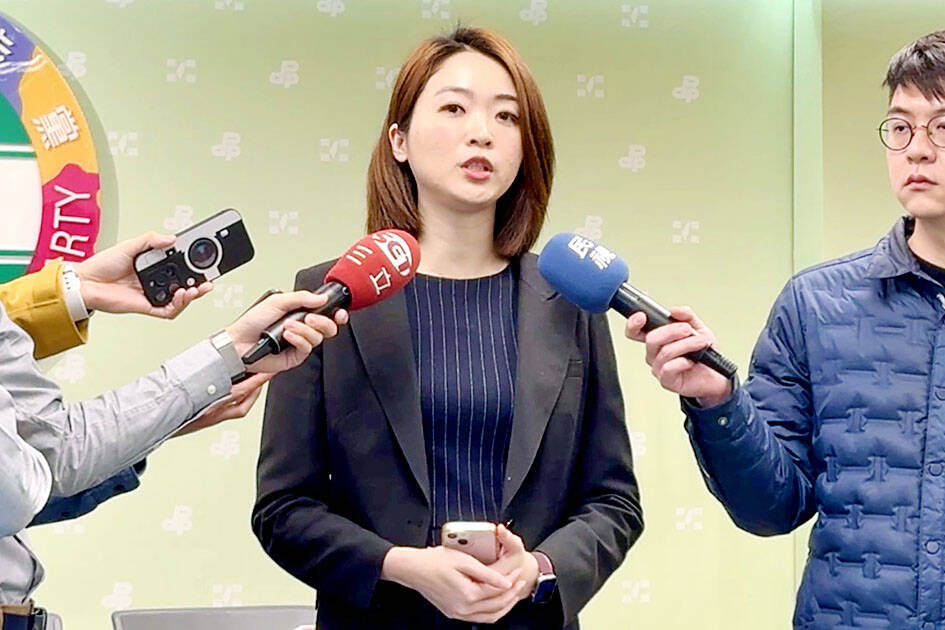The Democratic Progressive Party (DPP) yesterday said it would communicate with its grassroots members following pushback over a directive from President William Lai (賴清德) to refrain from hiring relatives or partners as assistants.
The president’s directive highlights that the DPP is a law-abiding and honest party, but the policy would have a grace period before implementation, DPP spokeswoman Han Ying (韓瑩) said, adding that the policy would have to be ratified by the party’s Central Executive Council.
Lai on Wednesday called for stricter standards among party members, saying that assistants for the people’s representatives should observe Article 26 of the Civil Servants’ Appointment Act (公務人員任用法) and should not hire spouses or third-degree relatives within the same organization, or appoint them to positions of authority, according to a source at the party’s Central Standing Committee meeting.

Photo: George Tsorng, Taipei Times
The party would continue efforts to reach out to party members opposing the issue and would unveil how the directive would be implemented in detail at a later date, Han said.
The directive is not aimed at any individual, but rather at the issue of rampant abuse of assistants’ funds by representatives across all parties, Han said.
DPP Legislator Lin Tai-hua (林岱樺) has been accused of embezzling up to NT$23 million (US$700,792) in assistants’ fees since 2001.
Chinese Nationalist Party (KMT) Legislator Yen Kuan-heng (顏寬恒) has been accused of embezzling NT$1.08 million of funds intended for hiring assistants.
DPP New Taipei City Councilor Lin Ping-yu (林秉宥) yesterday on Facebook said that he opposed the directive, stating that the percentage of people hiring third-degree relatives as assistants was in the minority and the party should not enforce a party-wide ban on the issue.
It is illogical, does not conform to the principle of proportionality and could even be a logical fallacy, he said, adding that writing such instructions into the party chapter was trying to make the lives of DPP members more difficult.

The manufacture of the remaining 28 M1A2T Abrams tanks Taiwan purchased from the US has recently been completed, and they are expected to be delivered within the next one to two months, a source said yesterday. The Ministry of National Defense is arranging cargo ships to transport the tanks to Taiwan as soon as possible, said the source, who is familiar with the matter. The estimated arrival time ranges from late this month to early next month, the source said. The 28 Abrams tanks make up the third and final batch of a total of 108 tanks, valued at about NT$40.5 billion

Two Taiwanese prosecutors were questioned by Chinese security personnel at their hotel during a trip to China’s Henan Province this month, the Mainland Affairs Council (MAC) said yesterday. The officers had personal information on the prosecutors, including “when they were assigned to their posts, their work locations and job titles,” MAC Deputy Minister and spokesman Liang Wen-chieh (梁文傑) said. On top of asking about their agencies and positions, the officers also questioned the prosecutors about the Cross-Strait Joint Crime-Fighting and Judicial Mutual Assistance Agreement, a pact that serves as the framework for Taiwan-China cooperation on combating crime and providing judicial assistance, Liang

A group from the Taiwanese Designers in Australia association yesterday represented Taiwan at the Midsumma Pride March in Melbourne. The march, held in the St. Kilda suburb, is the city’s largest LGBTQIA+ parade and the flagship event of the annual Midsumma Festival. It attracted more than 45,000 spectators who supported the 400 groups and 10,000 marchers that participated this year, the association said. Taiwanese Designers said they organized a team to march for Taiwan this year, joining politicians, government agencies, professionals and community organizations in showing support for LGBTQIA+ people and diverse communities. As the first country in Asia to legalize same-sex

MOTIVES QUESTIONED The PLA considers Xi’s policies toward Taiwan to be driven by personal considerations rather than military assessment, the Epoch Times reports Chinese President Xi Jinping’s (習近平) latest purge of the Chinese People’s Liberation Army (PLA) leadership might have been prompted by the military’s opposition to plans of invading Taiwan, the Epoch Times said. The Chinese military opposes waging war against Taiwan by a large consensus, putting it at odds with Xi’s vision, the Falun Gong-affiliated daily said in a report on Thursday, citing anonymous sources with insight into the PLA’s inner workings. The opposition is not the opinion of a few generals, but a widely shared view among the PLA cadre, the Epoch Times cited them as saying. “Chinese forces know full well that